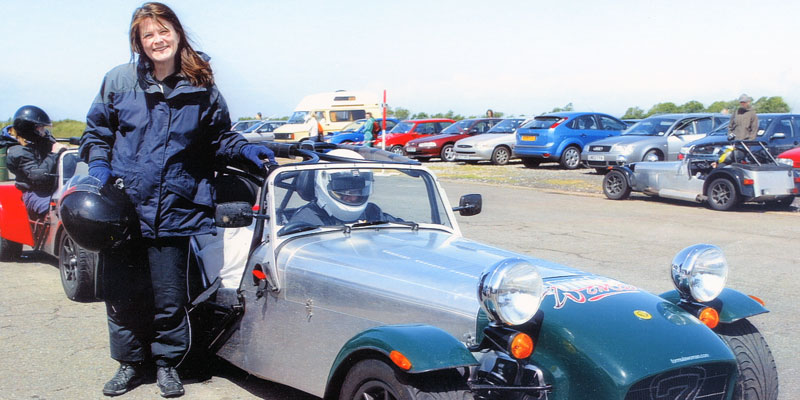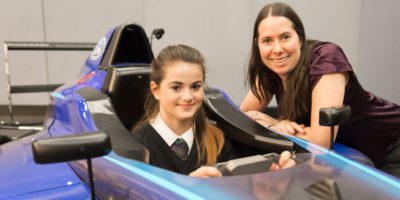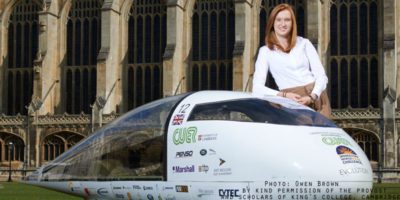Karen Holford is a Professor of Mechanical Engineering at Cardiff University. She joined the University’s School of Engineering in 1990, becoming its director in 2010 and going on to be appointed as Pro Vice-Chancellor of their College of Physical Sciences and Engineering in 2012. Before joining the University Karen worked in industry in a variety of roles and she has had a lifelong passion for motor sports.

“…there are certainly a much higher proportion of women engineers in Germany. My observation was that German engineering companies tend to look after their staff very well, with lower working hours and more holidays yet they tend to have higher productivity; perhaps there is a message there for the UK…”
Becoming an engineer against the odds
I’ve loved motorsport ever since I was a child. My interest came from my parents – Mum and Dad both loved motorsport and used to take us all (four daughters!) to watch both Formula One and motor cycling Grand Prix racing at Silverstone and Brands Hatch.
However, when I was at school I was actively discouraged from pursuing a career in engineering. My careers advisor didn’t know how to deal with a young girl who wanted to study what was seen to be a predominately male subject.
It was actually my art teacher who helped me get to university. She told me that I could get an undergraduate apprenticeship where they’d pay for me to go to university and work at the same time. She helped me to apply and I got a place with Rolls-Royce. As part of my apprenticeship I was sponsored to attend Cardiff University, where I read Mechanical Engineering.
Theory and practice – a powerful combination
I loved both the academic work at university and the applied work at Rolls-Royce and always felt that it was easier to understand the theory when I was able to draw on the industrial relevance.
I worked in “engine strip and rebuild” during the Falklands war; an amazing experience because we had to work around the clock repairing Pegasus engines for the Harrier Jump Jet which was used extensively in the Falklands.
I returned to Rolls-Royce after graduation but was soon drawn to research and studied for a Ph.D. [Doctor of Philosophy], which was sponsored by the EPSRC [Engineering and Physical Sciences Research Council] and the HSE [Health and Safety Executive]. Again, I spent a considerable amount of time working on industrial applications; working with various industries to develop an effective method for non-destructive testing of wire ropes.
After my Ph.D. I worked as a senior design engineer at AB Electronic Products Ltd. This was primarily a research and design role and I worked on many projects, most of which were connected with automotive engineering, including projects with Jaguar, Rover and BMW.
BMW in Munich – more female engineers and better work / life balance for everyone

My work with BMW was really exciting because I was transferring technology researched, designed and developed in Wales under my leadership to BMW for use in their ABS [anti-lock braking] system.
As a result I worked in Munich for long periods and that was incredibly informative – engineers are highly regarded and there are certainly a much higher proportion of women engineers in Germany. My observation was that German engineering companies tend to look after their staff very well, with lower working hours and more holidays yet they tend to have higher productivity; perhaps there is a message there for the UK.
Making the leap from industry into back into academia
I’m naturally inquisitive and I think it’s that sense of curiosity that led me back into academia. As an engineer you want to make things better, solve problems and improve things. There are so many unanswered questions; through my research I hope to be able to solve problems and make things better – that’s what drives me.
The rise and rise of blended learning
I think a blended learning approach is becoming more and more important as employers look for graduates with “on the job” experience, whether obtained through a formal apprenticeship or through an industrial placement during undergraduate degrees.
At Cardiff University we’ve just launched a National Software Academy to deliver a software engineering programme that is industry-focused and vocational in nature. A key feature of the course is to give students the opportunity to work with industry on real life projects based on existing commercial problems.
Engineering apprenticeships are very flexible in terms of the “on-the-job” element and this will change with the needs of each industry, with high technology skills being of increasing importance.
Government intervention
Developing a skilled work force has been, and always will be, critical to industry and of vital importance to Government. That hasn’t changed but what has changed is the level of Government intervention and this is crucial.
It is very expensive to train apprentices properly and in my opinion this is best achieved in partnership between industry and Government, yet state intervention has been variable.
Without Government support, apprenticeships decline as we saw between the 70s and the 90s when the UK went from levy-funded programmes via the industrial training boards, to no support or intervention at all and as a result the number of apprentices fell from 370,000 in 1979 to 180,000 in 1995.
Government concerns about skills shortages have resulted in increased investment which has improved the numbers, which stood at around 860,000 in 2012.
Looking at the current Rolls-Royce information, they state: “A Rolls-Royce apprenticeship is your ticket to world-class training and mentoring, huge investment, a degree-level education and the potential to enjoy opportunities with us around the globe,” – this was certainly true for me in the eighties and is just as relevant today.
Pushing engineers to be innovative and creative

Attracting more women into engineering through motor sport
I’ve taken every opportunity I can to be involved in motor sport; as a spectator, engineer and driver. I took part in the early rounds of the Formula Woman Championship in 2004; driving a Caterham 7 made me really smile.
We have an initiative in UK universities called Formula Student and this is a great way for students to gain that blended learning experience. There are some fantastic engineering role models who have contributed fully to the Cardiff Racing Formula Student team such as Katherine Scott who now works as a design engineer for Triumph Motorcycles and Michelle Davis who is a design engineer for the engine systems team at Williams F1.
I’m sure they will have brilliant engineering careers and are important role models to encourage more women into engineering.
Advice for girls looking to get into the automotive sector
To school girls who aspire to work in the automotive sector I would say, get as much practical experience as you can alongside your studies. Use support networks such as WISE [Women into Science and Engineering] and WES [the Women’s Engineering Society] to get a mentor who can help you to make sensible decisions about subject choices and introduce you to people working in the industry.
Once you get to university join your Formula Student team and seek an industrial placement in any related industry. Do not be afraid to ask for help from as many people as possible – including the companies themselves – remember they want talented people and are just as keen to attract good staff as you are to get a job.
The future: Universities sharing Athena SWAN to help industry understanding gender issues and develop equality plans to address them?
Signing up to the Athena Swan Charter and working towards their awards has enabled universities to understand their own gender issues and develop equality action plans to address them. This is beginning to have a profound effect on the work culture and improving conditions for both women and men.
Now we should share this process with industry by helping them to develop their own version of Athena Swan in order to address the many issues that still prevent them recruiting, retaining and promoting sufficient women to provide the skilled, talented workforce that they need.
https://twitter.com/karenholford
https://twitter.com/cardiffuni
https://www.facebook.com/cardiffuni?fref=ts





